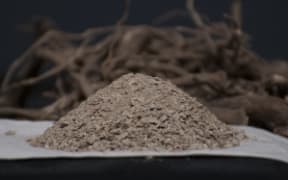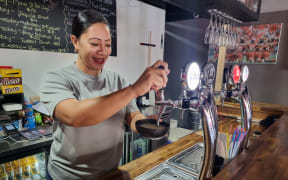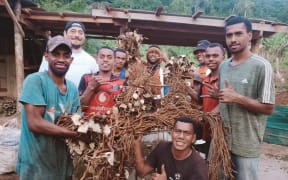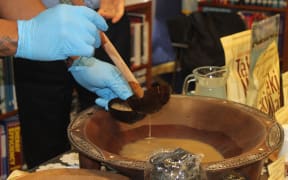By Doug Dingwall
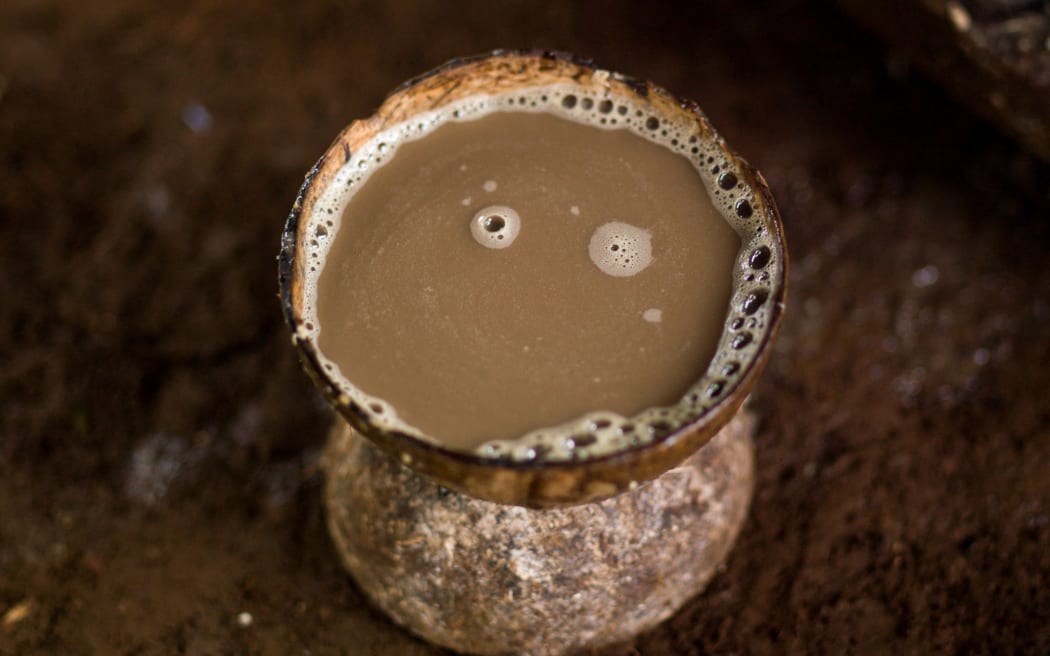
Kava is known for its woody taste, muddy colour and sedating effects. File photo Photo: Eric Lafforgue / Hans Lucas / Hans Lucas via AFP
It is an evening ritual familiar in towns and villages across Vanuatu.
Before sunset, many people stop for "mae taem" - having a shell of kava and some conversation with friends.
The beverage is woven deeply into life in the Pacific Island nation, and for kava exporter Jon Naupa, its importance to family incomes is hard to overstate.
"It's like our oxygen," he says.
Naupa operates his business, Mount Kava, near the capital city Port Vila.
He sees growers put children through school and pay medical bills using income from the crop.
He says it is a natural livelihood for many - despite the country's development challenges.
"It helps you bridge all that," he says.
Vanuatu is joining other Pacific nations looking overseas to generate more income from kava, as demand for the crop grows and potential new markets open.
It is estimated the crop made up half of Vanuatu's exports in 2020.
Kava was calculated to be about 28 percent of Tonga's exports that year, while Fiji also sells large amounts to customers abroad.
One part of the region's new export push is to protect kava with a geographical indication (GI).
That is a marker saying a product comes from a particular region, giving it a unique quality or reputation.
It could work similarly to other GI around the world - including most famously for Champagne, a marker for sparkling wine from that region of France.
Growing demand
Pacific Island nations are considering the protections as growers outside the region begin to produce kava, including in parts of mainland US.
Pacific value chain specialist Sanfred Smith says a GI, marking kava as a Pacific product, would protect its reputation and build consumer trust.
"It is a culturally significant crop with a long history and traditional use in ceremonies, and social gatherings across the region," he says.
"In recent years, there has been a growing global demand for kava due to its purported relaxation and stress relief properties.
"Now as a result, the commercialisation of kava presents opportunities for Pacific nations to capitalise on this demand and generate revenue through exports."
Pacific Islands Forum secretariat trade policy officer Sapai Moana Matariki says a GI for kava could increase its value and bring more income to the region.
"We have to start now to look at how we can protect the name and the cultural aspects of kava," she says.
GI would also make it easier to track kava production from planting to retail sale, Matariki says.
Officials from Pacific Island nations endorsed in-principle a regional kava strategy, including pursuing a GI for kava, in Port Vila in November.
They will discuss their next step at a meeting in Fiji in March.
Ready for harvest
Kava is known for its woody taste, muddy colour and sedating effects.
It is emerging as a popular beverage in Australia after the federal government eased commercial import restrictions in 2021.
Today, it is marketed widely and sold online in powder form.
It is estimated Australia imported about 130 tonnes of kava from the Pacific in the first 10 months after commercial imports were allowed, most of it coming from suppliers in Fiji, Tonga and Vanuatu.
In Vanuatu, Naupa sees room for growth in the country's kava industry.
But he is sceptical about creating a GI for the product.
He says it is more important to focus on marketing and promotion - another priority identified in the regional kava strategy.
"Just get out here and say, 'look, we're growing organically certified kava, we've been doing it for hundreds of years, we know when a kava plant is ready, when to harvest it, what it tells us with the colouring in its leaves'," Naupa says.
Fiji-based founder and managing director of Green Gold Kava, Praveen Narayan, supports GI for kava.
"It has been grown in the Pacific for the last 3000 years. And it is culturally symbolic for the Pacific to say kava is a Pacific product."
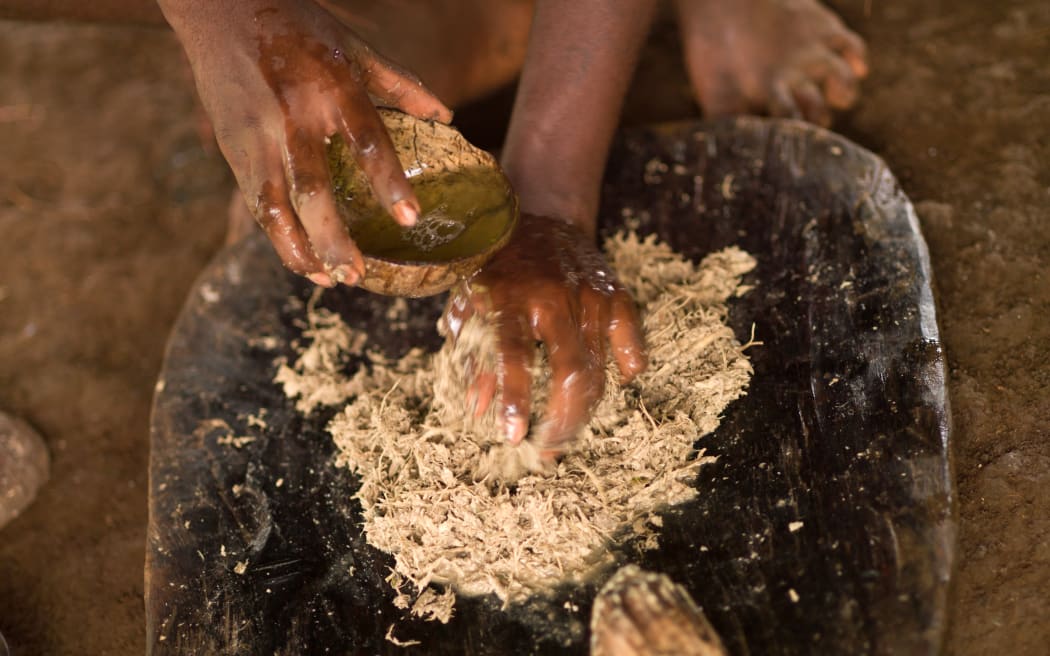
A woman prepares and squeezes kava to drink at a traditional ceremony in Sanma Province, Espiritu Santo, Vanuatu. File photo Photo: Eric Lafforgue / Hans Lucas / Hans Lucas via AFP
The road ahead
Matariki said Pacific Island nations would pursue GI protections at both a national level and with a regional framework.
They are seeking advice from the World Intellectual Property Office about their options.
GI featured prominently in recent free trade negotiations between Australia and the European Union, when the EU pushed for restrictions on product names such as prosecco.
Monash University law professor Mark Davison, who specialises in intellectual property, says Pacific Island nations could face challenges convincing other countries to accept GI for kava through trade deals.
"Going by the history of the United States, and its approach to geographical indications, that will be hard," he says.
Another difficulty could be the name.
Kava is used to identify the plant harvested for the beverage, known scientifically as Piper methysticum.
"They do have the problem of what do you call it, if it's grown in, say, Florida? Because at the moment you call it kava, and I'm not aware that there's any other name for it," Professor Davison says.
He says Pacific Island nations might be able to increase their chances by aiming to protect a more specific name, such as "Pacific kava" or "traditional kava".
Professor Davison says they could also find an easier option through registering a certified trademark, which identifies rules for using the product name, including the plant used and where the product is made.
Back in Vanuatu, Naupa is more concerned about other needs for the nation's kava industry, saying it needs to consistently meet international standards.
But he believes his country's long traditions in cultivating kava gives it a head start on any potential competition from the US.
"Kava is a very fragile, finicky, funny plant. It's not just stick it in the ground and it grows. Anyone who tells you that has never planted kava," he says.
"You've got to have the right amount of shade, you've got to watch out for El Nino coming up, you've got to look at the drainage."
- This story was first published by ABC
